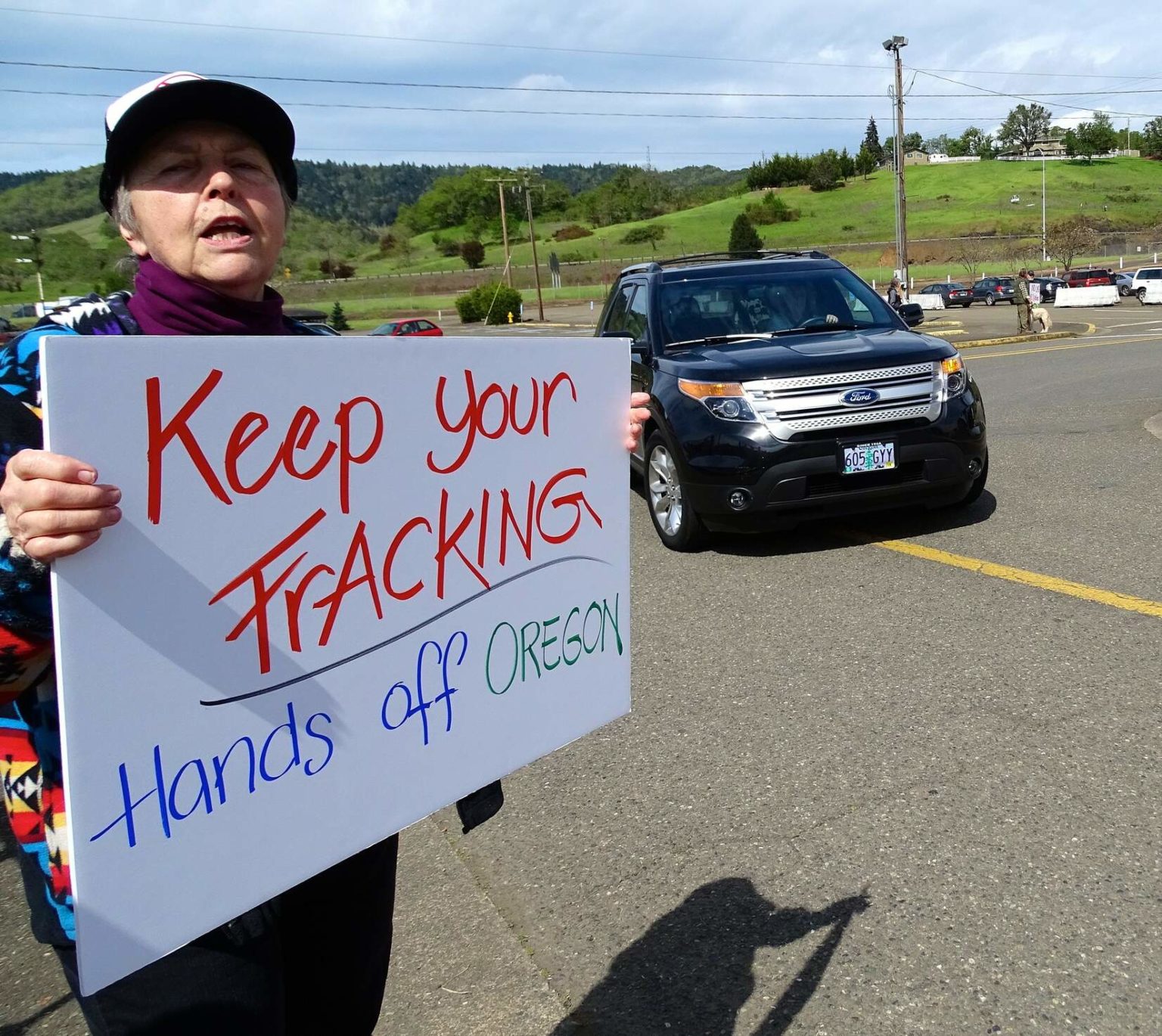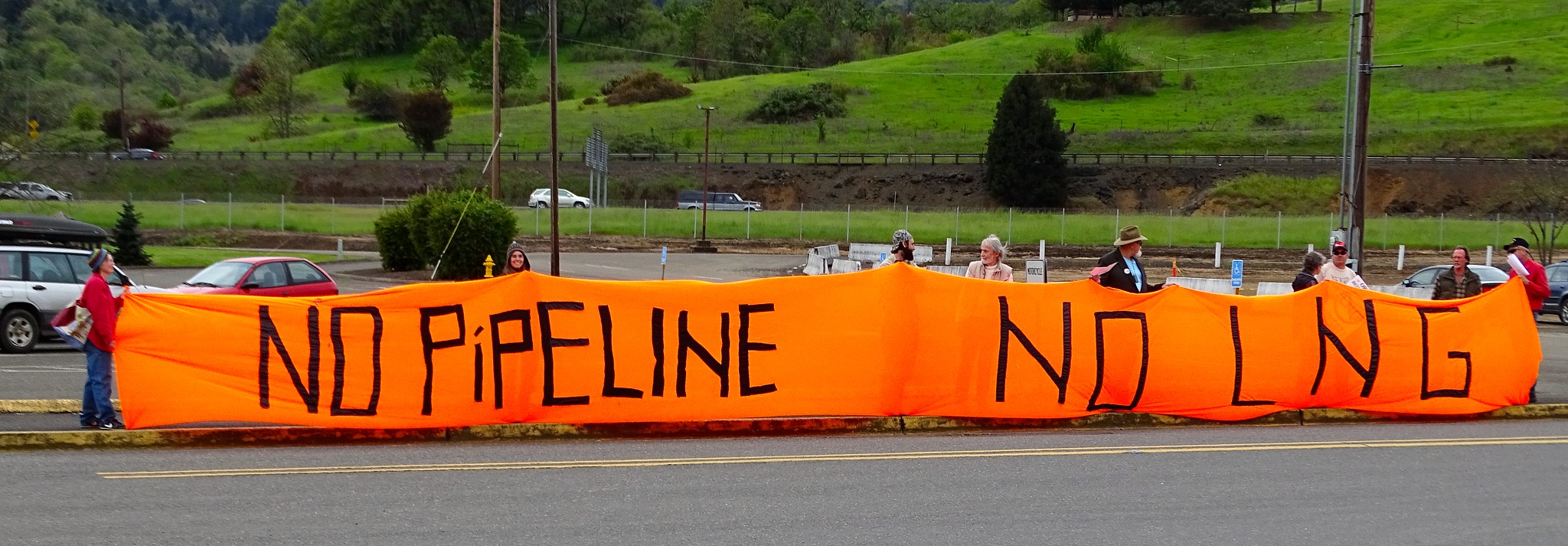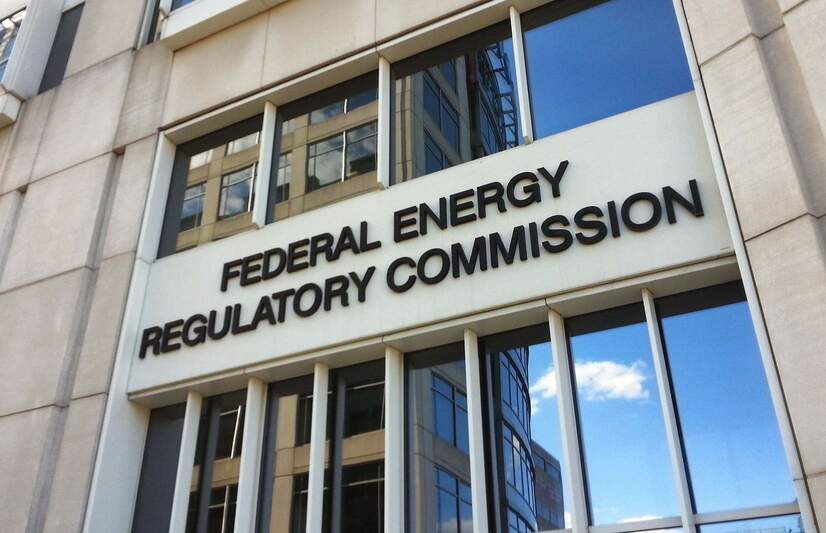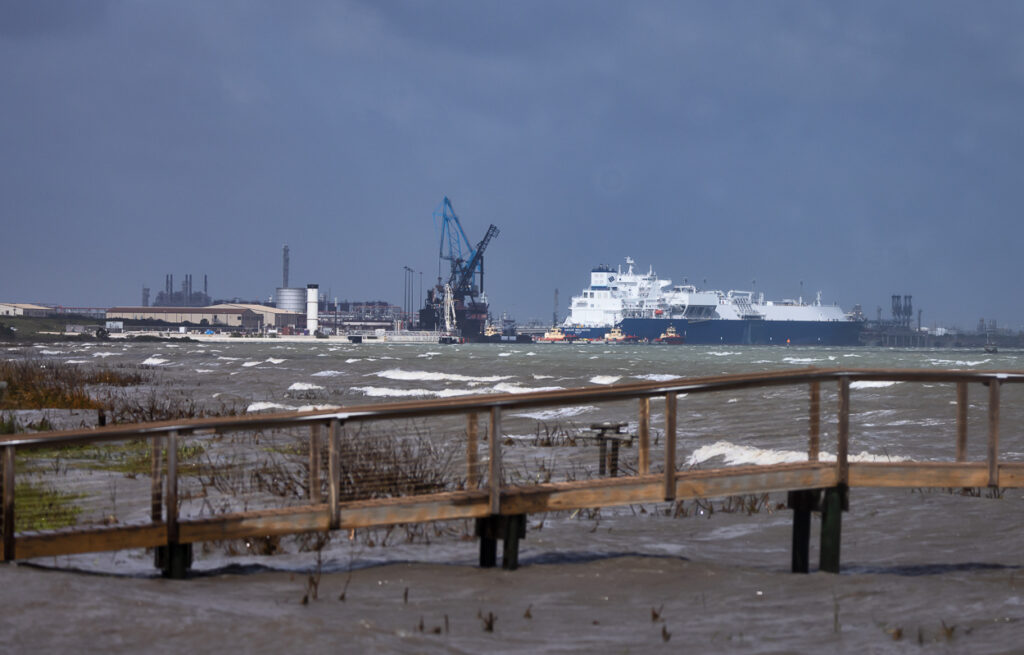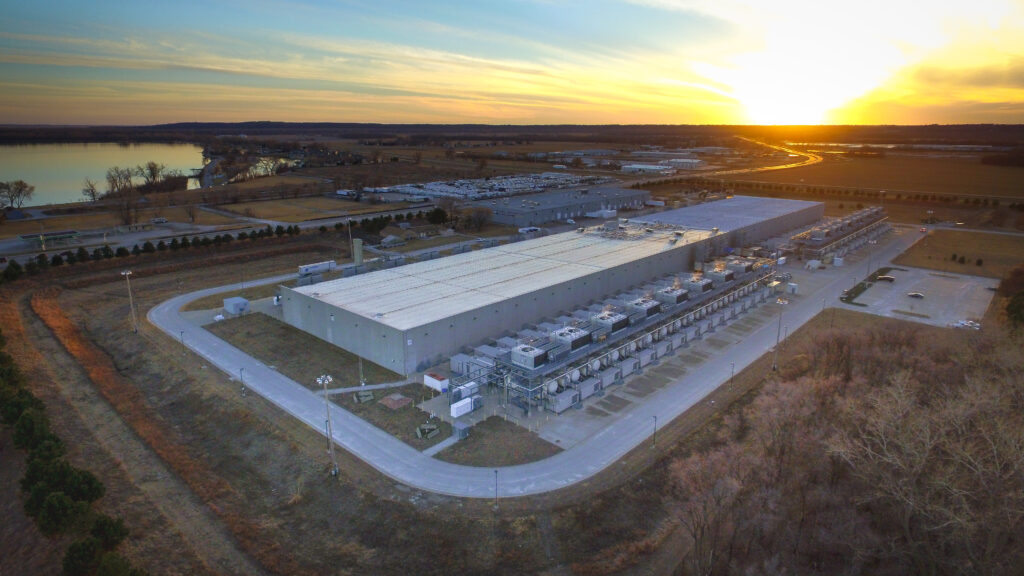In 2005, Deb Evans and her husband Ron Schaaf bought a piece of property in Klamath County, Oregon, where they hoped to build a house and selectively harvest timber on the land. They saw it as a long-term investment. About a month after they closed on the property, they went to walk through portions of it where they considered building a home, but they noticed orange survey tape hanging from the trees. “We had no idea who had put it there or why,” Evans said.
After calling around, they soon found out that a company wanted to build a liquefied natural gas (LNG) import terminal in Coos Bay on the Oregon coast, and run a natural gas pipeline to California — and Evans’ land was in the way. If the company’s plans worked out, the pipeline would travel right through their property.
A decade and a half — and two White House administrations — later, there’s still no pipeline.
But the project still looms over Evans and Schaaf, limping along in a zombie-like fashion. The Jordan Cove LNG project, now overseen by Canadian company Pembina, just won’t seem to die — even after it had been rejected by federal regulators twice and had key environmental permits denied. Now, in a final attempt to stop the pipeline that would supply the LNG terminal, local residents are suing to protect their property.
Evans and a group of about two dozen landowners, represented by the Niskanen Center, a nonpartisan think tank based in Washington, D.C., are appealing the Trump administration’s approval of the pipeline (reversing an Obama-era rejection) in a case that will be heard by the D.C. Circuit Court of Appeals in 2021. The outcome could have far-reaching ramifications for how pipelines get built in the U.S., and how pipeline companies can use eminent domain to take private land.
Taking Land for no Public Benefit
Paving the path for the Jordan Cove project, which was redesigned years ago to export LNG instead of importing it, was top of the agenda in the early months of the Trump administration.
“The first thing we’re going to do is we’re going to permit an LNG export facility in the Northwest,” Gary Cohn, director of the National Economic Council for President Trump, said in April 2017. “The one place we’re going to permit in the Northwest, it’s been turned down twice already.”
The Federal Energy Regulatory Commission (FERC) originally rejected the project in 2016 — and for good reason. The environmental damages would be significant. The associated 230-mile Pacific Connector Gas Pipeline, which would feed gas from central Oregon to an export terminal on the coast, would cross over 300 water bodies, including the Coos, Rogue, and Klamath Rivers. It would also impact over 2,000 acres of forest, including 750 acres of old-growth forest, while also potentially impacting over 20 federally listed threatened or endangered species, such as the northern spotted owl and Coho salmon.
Ultimately, however, FERC rejected the project not because of environmental concerns, but because of the risks from its use of eminent domain. In the U.S., companies can use eminent domain to take private land for a project that has some public benefit, such as a school, a highway, or a hospital. Under the Natural Gas Act, FERC gets to make that determination when it concerns a natural gas pipeline, and the commission weighs pros and cons of the project when deciding.
Oregonians protest the Jordan Cove LNG terminal and associated pipeline on April 13, 2015. Credit: Francis Eatherington, CC BY–NC 2.0
Jordan Cove faced several problems. First, it had never actually signed up any customers to firm contracts, a critical piece of evidence that FERC looks at when determining if a project is necessary. For all the years spent on the drawing board, Jordan Cove still couldn’t find buyers in Asia for this new supply of West Coast gas. In addition, the gas would be entirely for export. Meaning, none of it would be consumed domestically.
So, in FERC’s view, all of this meant there was no obvious need for the project, and no public benefit, while the costs to landowners — the seizure of their land — would be substantial.
To top it off, Jordan Cove has struck out trying to land permits in Oregon. State regulators denied a key water quality permit in May 2019. In January 2020, Jordan Cove withdrew a separate permit application for coastal dredging for the terminal in anticipation of that too getting rejected. In February, another state agency denied a third critical permit because of the negative impacts the project would have on the coast.
Regulatory Roller Coaster
Nevertheless, in March 2020, FERC approved the pipeline and export terminal. Not much has changed since the application was rejected in 2016 — except for the makeup of FERC itself. By law, neither political party can control more than three of the five seats on the commission. In 2016, Democrats had a majority on the commission. But by 2020, Republicans had a majority, but the commission had two unfilled seats. When FERC granted Jordan Cove its approval earlier this year, Oregon Senator Ron Wyden (D) denounced the Trump administration’s efforts to “stack” the commission and leave it unbalanced. “Today, a stacked and incomplete FERC approved the controversial and complicated Jordan Cove project. There was no rush. A balanced and full FERC should have made the decision,” Sen. Wyden said in a statement.
Even with Republican control, FERC’s approval of this particular project stood out, given the agency’s past decisions rejecting the project. “They approve something that’s already been denied twice before in an administrative agency that approves over 99% of these projects. That speaks volumes of what they are trying to do out in Oregon,” said Megan Gibson, an attorney at the Niskanen Center who is representing Deborah Evans and other landowners in their appeal. FERC rejected the project in March 2016, and then denied the company a rehearing later that year, reaffirming its decision.
In addition to lacking customers, all of Jordan Cove’s gas is going overseas, presenting another legal problem for the project. Jordan Cove obtained FERC approval under Section 7 of the Natural Gas Act. This means the company can now use eminent domain to take land in order to build its pipeline. But the landowners argue that the seizure is unconstitutional because there is no benefit to the public. “The distinction between this pipeline and every other pipeline under Section 7 is that it is 100 percent for export,” Gibson said. “All of the gas flowing through the pipeline into the LNG facility is going overseas.”
Moreover, she says, Jordan Cove has misled U.S. regulators and the public into thinking that the natural gas would come from producers in the U.S. Rocky Mountain region, such as Wyoming, Colorado, and Utah. For example, when FERC approved the project in March 2020, Pembina’s press release touting the project repeatedly talked up the opportunity to the “Rocky’s basin” and to “Western Colorado,” but said nothing about gas coming from Canada. In other instances, company materials say that the gas will come from both Canada and the U.S. Rockies.
But “most, if not all, of the gas is Canadian gas,” Gibson said. Jordan Cove’s communications with Canadian regulators back this up. In 2013, Jordan Cove went to Canada’s National Energy Board to obtain permits to export natural gas to the U.S.; in the application the company said the gas was destined for an export terminal at Coos Bay in Oregon. The company intended to use gas from Canada.
In addition, a 2019 report prepared for the Niskanen Center by consulting firm Synapse Energy Economics finds that Canadian gas is consistently cheaper than gas from the Rockies. The cost to ship the gas via pipeline from Canada is also cheaper than shipping it from the Rockies. These economics mean that it will likely be much cheaper for Jordan Cove to source its gas from Canada instead of from the Rockies.
“They’re talking out of both sides of their mouths,” Gibson said. In her eyes, Pembina tells Canadian regulators one thing, but tells an American audience another.
Federal Energy Regulatory Commission. Credit: Ryan McKnight, CC BY 2.0
According to Gibson, all of this undercuts the constitutionality of FERC’s approval. Under Section 7, the use of eminent domain “only applies to pipelines that are carrying gas considered to be interstate commerce,” Gibson said. “This pipe is not carrying gas in interstate commerce. It’s carrying gas that’s going to be in foreign commerce. That distinction between interstate commerce and foreign commerce has been clearly upheld by the D.C. Circuit in a number of cases.”
Essentially, because Jordan Cove will likely source its gas from Canada, and the gas will be entirely for export, there will be no public benefit to the U.S., the landowners’ lawsuit argues.
“The conclusion that it is in the public interest is not true. This is in the Canadian public interest. That’s true. But that’s not us,” Evans said. “Why should our land get subjected to this project?”
But even if the gas did come from the U.S., “they are still, legally speaking, on very, very shaky ground,” Gibson said. “Jobs and taxes generated by the construction of a pipeline are not ‘benefits’ under the Natural Gas Act,” Gibson said. “There is nothing in either the text or the legislative history.”
Jordan Cove and the parent company Pembina did not respond to a request for comment.
Landowners Fight Back
In August, Evans and the Niskanen Center filed a motion to have the FERC approval thrown out due to the threat of eminent domain looming over landowners. Evans and her lawyers believe they will prevail in the D.C. Circuit next year, so in the interim, they wanted the permit either tossed out or put on hold, especially since Jordan Cove hasn’t even obtained all of its state permits and faces long legal odds.
“Right now, this pipeline has the power to go into Oregon courts and start condemning land. And once they have possession of that land, that’s it. Even if the pipe doesn’t get built, they’re gonna have a permanent easement over these people’s land,” Gibson said.
The D.C. Circuit denied that motion in October. Instead, the case itself (Deborah Evans, et al v. FERC) will be heard in 2021.
The landowners believe they have a strong case due to past court rulings. In a similar lawsuit in 2019, City of Oberlin, Ohio v. FERC, the D.C. Circuit told FERC to revisit its approval for a pipeline in which only a portion of the gas would be exported — suggesting that Jordan Cove and its pipeline have an even higher bar to meet because none of its gas would be used domestically.
If the court sides with FERC, it will set a “very dangerous precedent,” Gibson said. If corporations can take private land simply on the basis that it would provide some economic activity — whether or not it was in the U.S. public’s interest specifically — then almost anything can be considered a “public benefit.” If that happens, “then we’re in some real trouble,” Gibson said.
To help build the case against the fossil fuel infrastructure, in September Oregon Senators Ron Wyden and Jeff Merkley introduced two bills to amend the Natural Gas Act to protect landowners against exploitation of eminent domain for pipelines. “FERC has empowered private pipeline companies to repeatedly abuse property owners with deeply dubious claims of eminent domain somehow being in the public interest,” Senator Wyden said in a statement. The bills would increase landowner protections and explicitly bar gas exports from being used as a justification for eminent domain. Both bills were referred to the Senate Commerce, Science and Transportation Committee, and face an uncertain future.
“A restoration of balance is desperately needed, and our bills would ensure the protection of landowners’ rights with due process that’s fair and just,” said Wyden.
The Jordan Cove project faces significant obstacles, given its struggle to obtain necessary state permits. Meanwhile, Evans and her husband, along with dozens of other landowners in southern Oregon, continue to live with the anxiety of losing their land for more than 15 years.
“Even if we win in our case a year from now, if they’ve already taken our property, we can’t get it back,” Evans said. Jordan Cove would be required to give them some compensation but not return the land.
To landowners like Evans and Schaaf, it’s maddening that the government is not looking out for them. “We thought we had constitutional rights that guarantee us property rights and things that protect private citizens from having a land grab,” Evans said. Given the uncertainty around the pipeline, she and her husband never ended up developing their land as they originally intended.
“This is not for a school, it’s not for a hospital, it’s not for an interstate, all of which we acknowledge benefits a wide variety of U.S. citizens,” she said. “The only people that are going to benefit from this are the people that are invested in fossil fuels.”
Main image: The proposed 230-mile Pacific Connector Pipeline through Oregon and proposed liquefaction terminal in Coos Bay would threaten landowners with eminent domain by the foreign corporation who wants to sell its gas to Asia. Credit: Francis Eatherington, CC BY–NC 2.0
Subscribe to our newsletter
Stay up to date with DeSmog news and alerts


